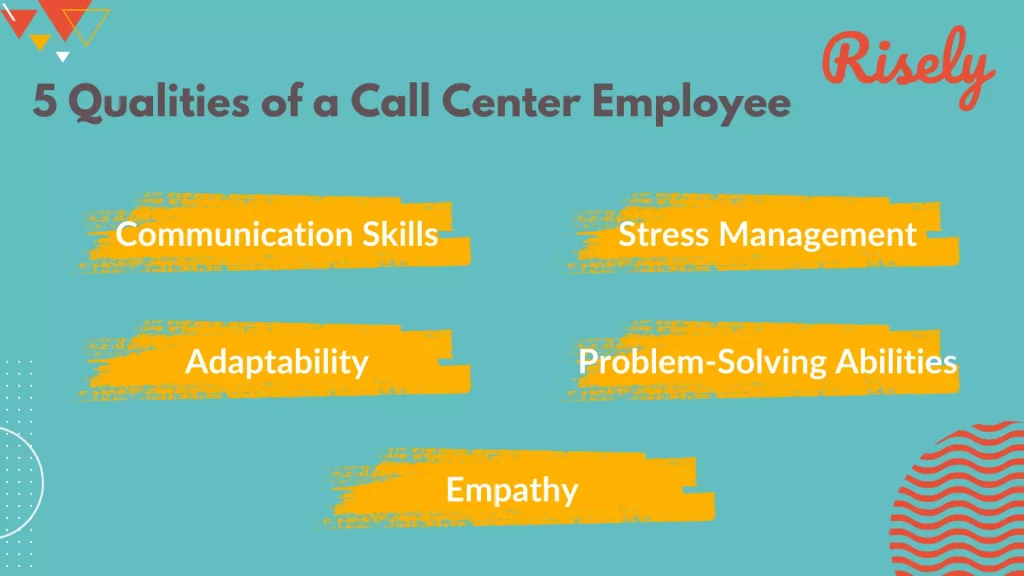9 Call Center Behavioral Interview Questions: With 5 Qualities To Look Out For
Finding the perfect call center representative is no easy feat. The key lies in asking the right call center behavioral interview questions that reveal a candidate’s true potential. In this blog, we embark on a journey deep into the realm of call center behavioral interviews. Discover the art of identifying crucial qualities that set exceptional candidates apart and gain valuable insights into the top nine behavioral interview questions tailored specifically for call centers. From assessing problem-solving skills to uncovering the hidden gems of empathy and adaptability, we’ve got you covered. Let’s dive in!5 Qualities to look out for a Candidate during a Call Center Behavioral Interview
During a call center behavioral interview, looking for specific qualities and behaviors that indicate a candidate’s suitability for the role is essential. Here are five key things to watch out for in a candidate:
- Empathy and Customer-Centric Approach: Look for candidates who demonstrate genuine empathy and a customer-focused mindset. They should show an understanding of customer needs and the ability to put themselves in the customer’s shoes. Candidates prioritizing customer satisfaction and exceeding expectations will likely excel in a call center environment.
- Communication Skills: Effective communication is crucial in a call center role. Observe how candidates articulate their responses, listen actively, and use appropriate language during the call center behavioral interview. Look for candidates who can convey information concisely and with a positive tone, as these skills are essential for resolving customer inquiries effectively.
- Problem-Solving Abilities: A successful call center representative must be a problem solver. Evaluate how candidates handle hypothetical or real-life scenarios involving customer issues. Assess their ability to analyze situations, identify root causes, and propose effective solutions. Look for candidates who remain composed and resourceful in finding resolutions.
- Stress Management and Resilience: Call center work can be demanding and stressful, so assessing a candidate’s stress management skills is vital. Ask questions about how they handle pressure and multitasking and their coping strategies in challenging situations. Candidates who demonstrate resilience and the ability to remain calm under pressure are likelier to thrive in a fast-paced call center environment.
- Adaptability and Flexibility: Situations can change rapidly in a dynamic call center setting. Look for adaptable candidates who quickly adjust to shifting priorities or customer needs. Candidates who show openness to feedback and a willingness to learn and improve are valuable assets to a call center team.

9 Call Center Behavioral Interview Questions
Question 1: Describe a situation where you successfully resolved a challenging customer issue.
Significance: This question assesses the candidate’s problem-solving skills, customer-centric approach, and ability to handle difficult situations calmly and effectively. Sample Answer: “In my previous call center role, I encountered a customer who was frustrated due to a billing discrepancy. I actively listened to their concerns, empathized with their situation, and assured them that I would investigate the issue. After researching the problem, I found the error and promptly rectified it. I followed up with the customer, apologized for the inconvenience, and offered a discount on their next purchase. The customer appreciated the gesture, and the positive feedback was later reflected in a customer satisfaction survey.”Question 2: How do you handle high-pressure situations when dealing with multiple customers simultaneously?
Significance: This question evaluates the candidate’s ability to manage stress, multitask, and maintain composure during peak call volumes. Sample Answer: “During high-pressure situations, I prioritize tasks based on urgency. I remain calm and focused, ensuring I provide each customer with undivided attention. I have a system for jotting down essential points while speaking with one customer so that I can quickly refer back to the notes while addressing another. Moreover, I make use of any available resources or team support to resolve complex issues efficiently.”Question 3: Share an experience where you went above and beyond to meet a customer’s needs.
Significance: This question assesses the candidate’s commitment to exceptional customer service and willingness to exceed expectations. Sample Answer: “I once received a call from a customer who needed help troubleshooting a technical issue with their product. After resolving the problem, I noticed that their warranty was about to expire. I took the opportunity to remind the customer and offered to extend their warranty for free, ensuring they felt valued and protected. The customer was pleasantly surprised and expressed gratitude for the extra effort.”Question 4: Explain when you dealt with an angry or upset customer. How did you handle it?
Significance: This question examines the candidate’s ability to handle difficult emotions, show empathy, and turn a negative situation into a positive one. Sample Answer: “Once, a customer called in, upset about a delayed delivery. I actively listened to their frustrations and validated their feelings. I apologized sincerely, then investigated the issue to provide a clear explanation. To make amends, I offered expedited shipping at no extra cost and assured the customer that their satisfaction was our top priority. By the end of the call, the customer’s anger had subsided, and they appreciated the resolution I provided.”Question 5: Give an example of when you had to adapt your communication style to connect with a customer.
Significance: This question evaluates the candidate’s communication versatility and ability to tailor responses to different customer personalities. Sample Answer: “I once had a customer who preferred concise answers and was in a hurry. I recognized this and adjusted my communication style accordingly, providing clear and to-the-point responses. On another occasion, I dealt with a customer who seemed more talkative and friendly. In that situation, I engaged in some small talk before addressing their query, which helped establish rapport and a positive interaction.”Question 6: Describe a situation where you identified a process improvement opportunity in your previous call center role.
Significance: This question assesses the candidate’s problem-solving abilities, proactive mindset, and potential to improve the call center’s efficiency. Sample Answer: “In my previous role, I noticed that we were receiving repetitive customer inquiries about a specific product feature. To streamline our support process, I proposed creating a comprehensive FAQ section on our website. After receiving approval, I worked with the team to compile the most frequently asked questions and their answers. This new resource reduced call volume and allowed our agents to focus on more complex issues, improving overall customer satisfaction.”
Question 7: How do you prioritize and manage your tasks to ensure timely responses to customer inquiries?
Significance: This question evaluates the candidate’s organizational skills, time management, and ability to balance competing priorities. Sample Answer: “To prioritize tasks effectively, I first assess the urgency and impact of each customer inquiry. I utilize a ticketing system to track and manage customer interactions, ensuring no query goes unnoticed. I also keep an eye on service level agreements to ensure timely responses. If I encounter multiple high-priority tasks simultaneously, I delegate tasks among team members based on their expertise, ensuring all customer needs are addressed promptly.”Question 8: Share a situation where you successfully upsold or cross-sold a product/service to a customer.
Significance: This question evaluates the candidate’s sales skills and ability to identify opportunities to enhance customer experiences. Sample Answer: “While assisting a customer with a product inquiry, I noticed that their needs aligned with another service we offered. I explained the benefits of the additional service and how it complemented their purchase. By tailoring my approach to their specific requirements, the customer recognized the value and agreed to include the extra service in their order, ultimately increasing their satisfaction with the purchase.”Question 9: Describe how you handle repetitive tasks while maintaining high enthusiasm.
Significance: This question assesses the candidate’s attitude toward routine tasks and their ability to stay motivated and engaged. Sample Answer: “I understand that repetitive tasks are an inherent part of call center work. To maintain enthusiasm, I focus on the impact my efforts have on customers. I remind myself that each call is an opportunity to create a positive customer experience, even if the issue seems routine. Additionally, I periodically take short breaks to refresh my mind and stay motivated throughout the day.” Remember that the sample answers are just examples; candidates should provide authentic and relevant experiences from their work history. The significance of these questions lies in assessing a candidate’s behavioral attributes, problem-solving abilities, customer focus, and adaptability – all essential qualities for a successful call center representative.Conclusion
Mastering the call center behavioral interview is the key to identifying exceptional candidates with the necessary qualities to deliver exceptional customer experiences. Employers can assess candidates’ problem-solving skills, adaptability, empathy, and customer-centric approach through carefully crafted questions and the STAR method. By prioritizing effective communication and stress management, call centers can build a team of resilient representatives ready to handle any challenge. Remember, preparation and practice are paramount, enabling candidates to showcase their best selves during interviews. You can also sign up for Risely to take assistance for testing and refining your skills.Gain the skills to resolve conflicts like a pro as a first-time manager!
Take the free conflict management assessment to navigate challenging situations as a first-time manager.
FAQs
What are the most common interview questions and answers in call center?
1. “Tell me about yourself” – Focus on relevant call center experience and customer service skills.
2. “How do you handle difficult customers?” – Emphasize empathy, active listening, and problem-solving abilities.
3. “Describe a time you exceeded customer expectations” – Share a specific example of going the extra mile to satisfy a customer.
2. “How do you handle difficult customers?” – Emphasize empathy, active listening, and problem-solving abilities.
3. “Describe a time you exceeded customer expectations” – Share a specific example of going the extra mile to satisfy a customer.
What skills are needed in a call center?
Effective communication, active listening, empathy, problem-solving, multitasking, adaptability, patience, customer focus, and computer proficiency are essential in a call center environment.
Other Related Blogs
How to Build a Leadership Journey? ft. Thomas Ulbrich
How to Build a Leadership Journey? ft. Thomas Ulbrich Effective leadership doesn’t always begin with a grand vision. Sometimes, it takes root in the courage to take the first step…
AI and Leadership Development: Driving Synergy for Growth
AI and Leadership Development: Driving Synergy for Growth You know the frustration all too well. Your organization invests thousands in leadership development programs, yet three months later, those workshops feel…
How Are AI Learning Platforms Transforming Leadership Development?
How Are AI Learning Platforms Transforming Leadership Development? As an L&D leader, you’re likely familiar with this frustrating reality: 82% of organizations consider leadership development critical(1), yet only 14% feel…
5 Essential AI Skills for L&D Leaders
5 Essential AI Skills for L&D Leaders According to LinkedIn’s 2025 Workplace Learning Report(1), 71% of L&D professionals are now incorporating AI into their learning strategies, nearly double the adoption…


